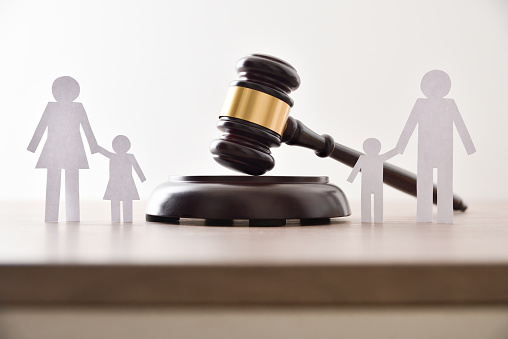GET A CASE EVALUATION:
(470) 946-6964
Atlanta Divorce Lawyer
Handling and navigating a divorce is always a difficult concept, and it can be easy to feel overwhelmed and confused, as well as unsure of where to start. During this difficult period, it is important that you have a qualified, experienced divorce lawyer on hand, with a strong background in family law, and we can help you to navigate the waters of divorce, and secure the best possible outcome for your family.

Types of Divorce in Georgia
Georgia law recognizes two main types of divorce
Contested
Contested divorces are those where both parties wish to end their marriage, but disagree over how to do so.
Uncontested
Uncontested divorces are those in which both parties agree that the marriage needs to come to an end, and therefore no negotiation takes place.

Contested Divorces
A contested divorce involves a court hearing where each side presents evidence and witnesses to support their position. It is important to note that although the process is often adversarial, the judge’s role is to make sure that all relevant facts are heard and that the best interests of the children are taken into account. The aim of the court is to reach a fair decision based on the evidence presented by both sides.
It is important to engage a strong divorce lawyer with a background in tackling family law cases; this will help you achieve the best outcome.
Uncontested Divorces
An uncontested divorce is one where both parties agree that the relationship should end, and they simply need to go through the formalities of ending the marriage. In some circumstances, the couple may choose to negotiate about what happens after the divorce, such as who gets the house, or who keeps the car. A divorce lawyer may not be essential in an uncontested divorce, but they may be able to advise on key areas of family law.

What Are The Legal Grounds For Divorce In Georgia?
The legal grounds for divorce in Georgia include:
● Irreconcilable Differences
Irreconcilable differences are one of the most common reasons for divorce. This occurs when two people cannot agree on how their marriage should be run, or what they want out of life together. Irreconcilable differences can lead to a breakdown in communication between partners, which can cause conflict and tension within the relationship. If you find yourself with irreconcilable differences, then it may be time to seek professional advice from an Atlanta divorce lawyer.
● Adultery
Adultery is another common ground for divorce, and this occurs when one partner cheats on the other, whether this is a one-off situation, or a long-term, ongoing affair. Adultery can be very damaging to a relationship, and in many cases, will be grounds for divorce.
● Desertion
Desertion is defined as occurring when one party leaves the marital home without informing or consulting their spouse and is legally defined as being the “continued and wilful desertion of a spouse for at least a year”. Desertion can be grounds for divorce, and it is also worth noting that if there are children involved, desertion could result in a parent losing custody of the child.
Conviction or Imprisonment Of One Spouse
If one spouse has been convicted of imprisonment of one spouse, then this would be grounds for divorce. Conviction of imprisonment of one spouse means that the person was found guilty of committing an offense against the law, and was sentenced to prison – this is considered a family law matter, and their spouse will then legally have grounds for divorce.
● Incapacity To Consent To Marriage
Incapacity to marriage is defined as a mental condition whereby one party lacks the capacity to consent to the marriage due to illness, injury, or any other reason. If this is found to be the case within a relationship, this will be considered legal grounds for the couple to be granted a divorce, and a good divorce lawyer will be able to advise.
● Domestic Violence
Domestic violence is a serious issue, and if one partner is physically or mentally abusing the other, then this will be grounds for divorce, even if the abuse does not occur every day. Domestic violence can take different forms, including physical abuse, emotional abuse, sexual abuse, stalking, and more.
What Happens After A Divorce Is Finalized?
Once the divorce process is finalized, there are several things that will happen. First, the parties involved must file paperwork with the court stating that the divorce is final. Once this is completed, the court will order the payment of any outstanding debts incurred during the marriage (such as mortgages, car payments, etc.)
If the couple has minor children, the court may also order either party to pay child support, depending on how much income they earn.
Will I Need To Pay Alimony?
Alimony or spousal support is money paid from one spouse to another following a divorce. This is usually awarded to help with the financial burden of supporting a former spouse and/or their children. There are many factors that can affect whether alimony is required, including the length of time you’ve been married, your income, and the age of your children.
Understanding alimony can be a challenge, and so it is important that you have a trustworthy divorce lawyer on hand to help you navigate the process.
Child Custody and Divorce
Some of the main factors a judge will use when assigning custody include:
- The ages of the children
- Whether the children have special needs, and the parent best equipped to manage and support these
- Any history of domestic violence between the parents
- The ability of the parents to provide for the children financially
- The stability of employment of the parents
- The health of the parents
- The parent's willingness to cooperate with each other and with the courts if necessary
- Any relationships with siblings or other family members
- Where the child goes to school
- Any religious education that the child is currently receiving
Child custody is another important factor in the process of divorce. In most cases of a contested divorce, child custody is decided by the courts, and this is done based on the best interests of the child. In some cases, both parents will share joint custody, meaning that each parent gets equal decision-making power regarding the upbringing of the child. In other cases, only one parent will get full custody, meaning that they will make all decisions about the child’s life, while the other parent will have limited visitation rights – again, these are usually set out by the courts.





How We Can Help
If you are facing the prospect of divorce, our experienced team is on hand to help with all aspects of family law matters. We know that navigating through the legal system can be stressful, but our top divorce lawyers want to ensure that you don’t face unnecessary stress and confusion.
Contact us today to find out more about how we can help you.

